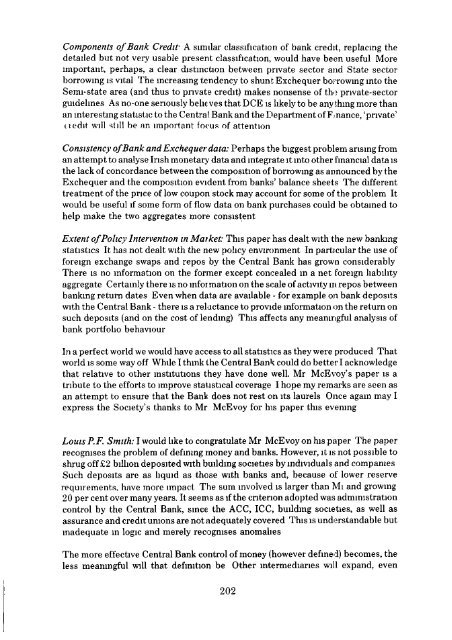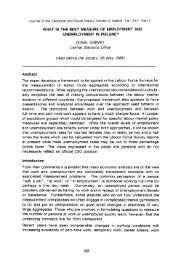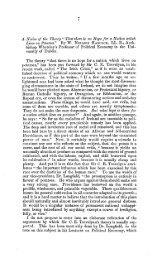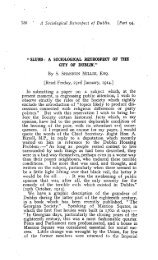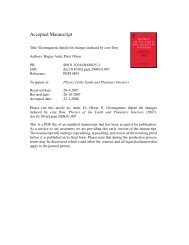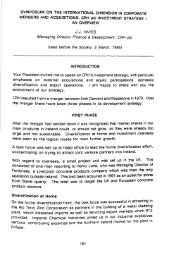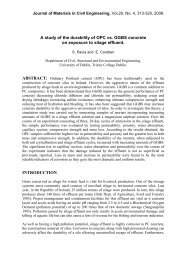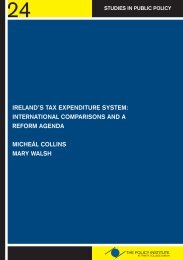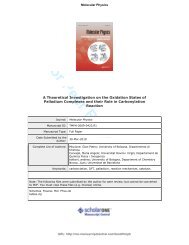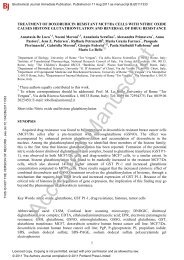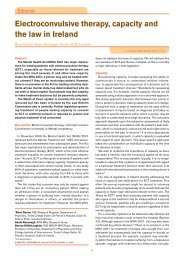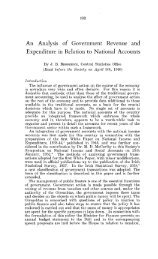parti: objectives and features of the new reporting system 159 - TARA
parti: objectives and features of the new reporting system 159 - TARA
parti: objectives and features of the new reporting system 159 - TARA
You also want an ePaper? Increase the reach of your titles
YUMPU automatically turns print PDFs into web optimized ePapers that Google loves.
Components <strong>of</strong> Bank Credit' A similar classification <strong>of</strong> bank credit, replacing <strong>the</strong><br />
detailed but not very usable present classification, would have been useful More<br />
important, perhaps, a clear distinction between private sector <strong>and</strong> State sector<br />
borrowing is vital The increasing tendency to shunt Exchequer borrowing into <strong>the</strong><br />
Semi-state area (<strong>and</strong> thus to private credit) makes nonsense <strong>of</strong> <strong>the</strong> private-sector<br />
guidelines As no-one seriously believes that DCE is likely to be anything more than<br />
an interesting statistic to <strong>the</strong> Central Bank <strong>and</strong> <strong>the</strong> Department <strong>of</strong> Finance, 'private'<br />
c 1 edit will still be an important focus <strong>of</strong> attention<br />
Consistency <strong>of</strong> Bank <strong>and</strong> Exchequer data: Perhaps <strong>the</strong> biggest problem arising from<br />
an attempt to analyse Irish monetary data <strong>and</strong> integrate it into o<strong>the</strong>r financial data is<br />
<strong>the</strong> lack <strong>of</strong> concordance between <strong>the</strong> composition <strong>of</strong> borrowing as announced by <strong>the</strong><br />
Exchequer <strong>and</strong> <strong>the</strong> composition evident from banks' balance sheets The different<br />
treatment <strong>of</strong> <strong>the</strong> price <strong>of</strong> low coupon stock may account for some <strong>of</strong> <strong>the</strong> problem It<br />
would be useful if some form <strong>of</strong> flow data on bank purchases could be obtained to<br />
help make <strong>the</strong> two aggregates more consistent<br />
Extent <strong>of</strong> Policy Intervention in Market: This paper has dealt with <strong>the</strong> <strong>new</strong> banking<br />
statistics It has not dealt with <strong>the</strong> <strong>new</strong> policy environment In <strong>parti</strong>cular <strong>the</strong> use <strong>of</strong><br />
foreign exchange swaps <strong>and</strong> repos by <strong>the</strong> Central Bank has grown considerably<br />
There is no information on <strong>the</strong> former except concealed in a net foreign liability<br />
aggregate Certainly <strong>the</strong>re is no information on <strong>the</strong> scale <strong>of</strong> activity in repos between<br />
banking return dates Even when data are available - for example on bank deposits<br />
with <strong>the</strong> Central Bank - <strong>the</strong>re is a reluctance to provide information on <strong>the</strong> return on<br />
such deposits (<strong>and</strong> on <strong>the</strong> cost <strong>of</strong> lending) This affects any meaningful analysis <strong>of</strong><br />
bank portfolio behaviour<br />
In a perfect world we would have access to all statistics as <strong>the</strong>y were produced That<br />
world is some way <strong>of</strong>f While I think <strong>the</strong> Central Bank could do better I acknowledge<br />
that relative to o<strong>the</strong>r institutions <strong>the</strong>y have done well. Mr McEvoy's paper is a<br />
tribute to <strong>the</strong> efforts to improve statistical coverage I hope my remarks are seen as<br />
an attempt to ensure that <strong>the</strong> Bank does not rest on its laurels Once again may I<br />
express <strong>the</strong> Society's thanks to Mr McEvoy for his paper this evening<br />
Louis P.F. Smith: I would like to congratulate Mr McEvoy on his paper The paper<br />
recognises <strong>the</strong> problem <strong>of</strong> defining money <strong>and</strong> banks. However, it is not possible to<br />
shrug <strong>of</strong>f £2 billion deposited with building societies by individuals <strong>and</strong> companies<br />
Such deposits are as liquid as those with banks <strong>and</strong>, because <strong>of</strong> lower reserve<br />
requirements, have more impact The sum involved is larger than Mi <strong>and</strong> growing<br />
20 per cent over many years. It seems as if <strong>the</strong> criterion adopted was administration<br />
control by <strong>the</strong> Central Bank, since <strong>the</strong> ACC, ICC, building societies, as well as<br />
assurance <strong>and</strong> credit unions are not adequately covered This is underst<strong>and</strong>able but<br />
inadequate in logic <strong>and</strong> merely recognises anomalies<br />
The more effective Central Bank control <strong>of</strong> money (however defined) becomes, <strong>the</strong><br />
less meaningful will that definition be O<strong>the</strong>r intermediaries will exp<strong>and</strong>, even<br />
202


